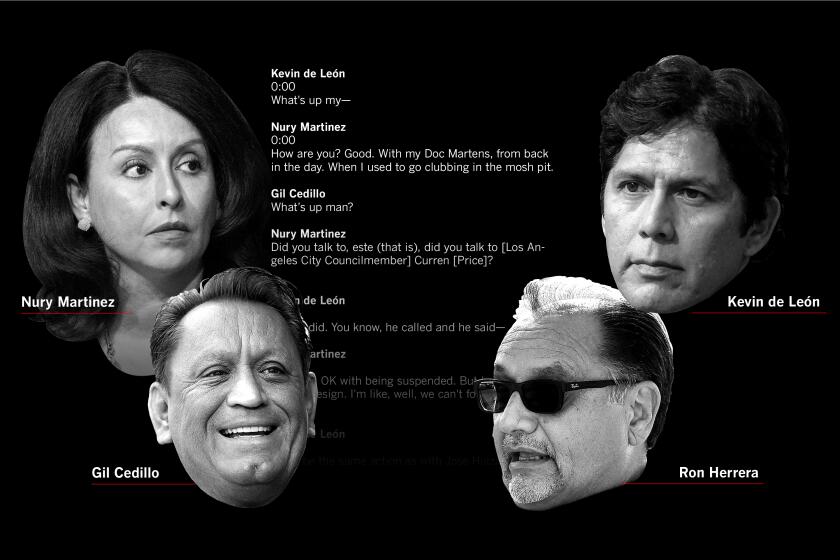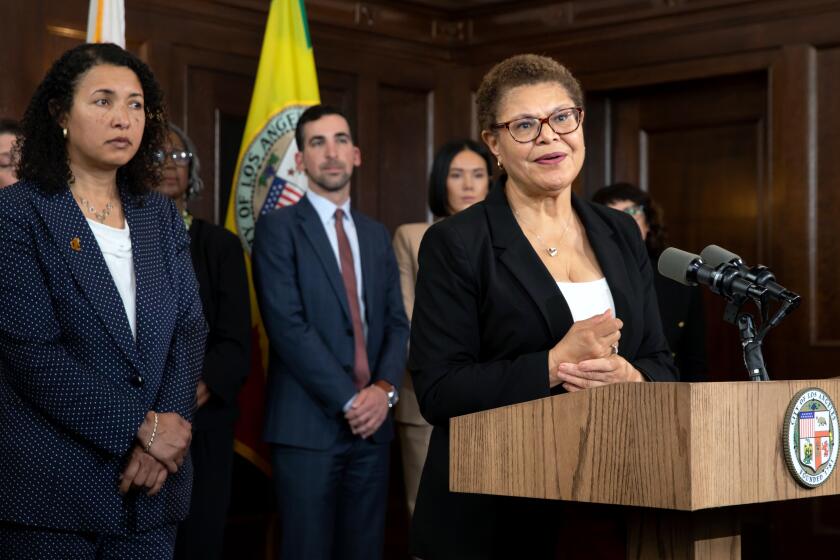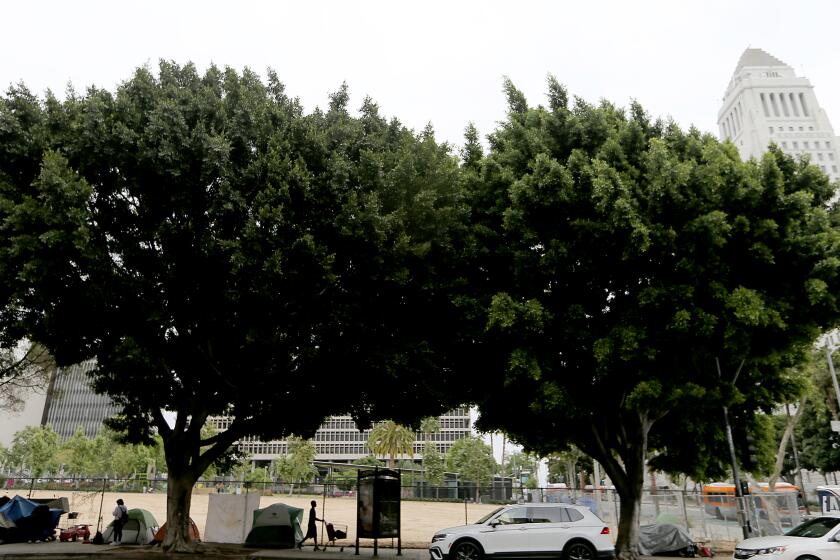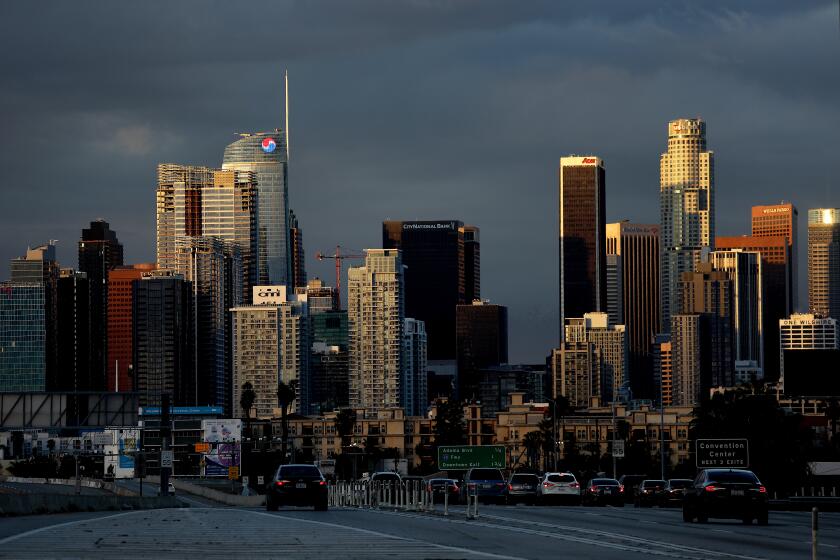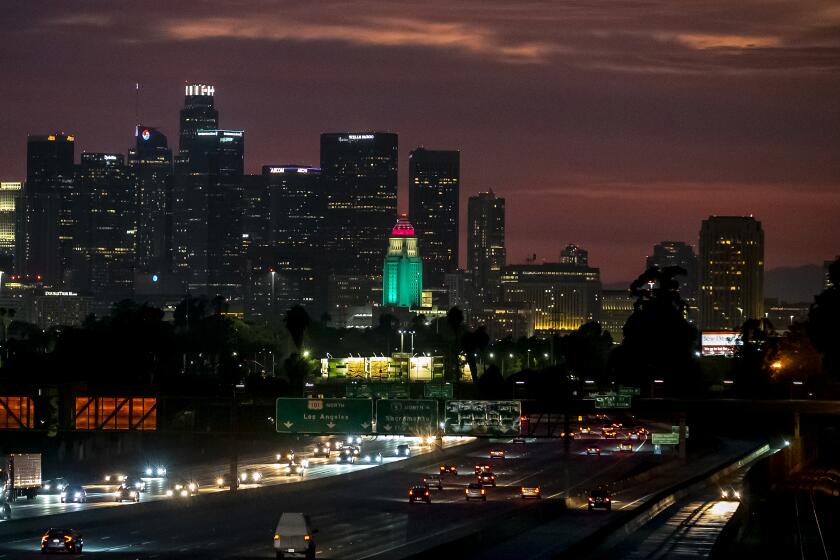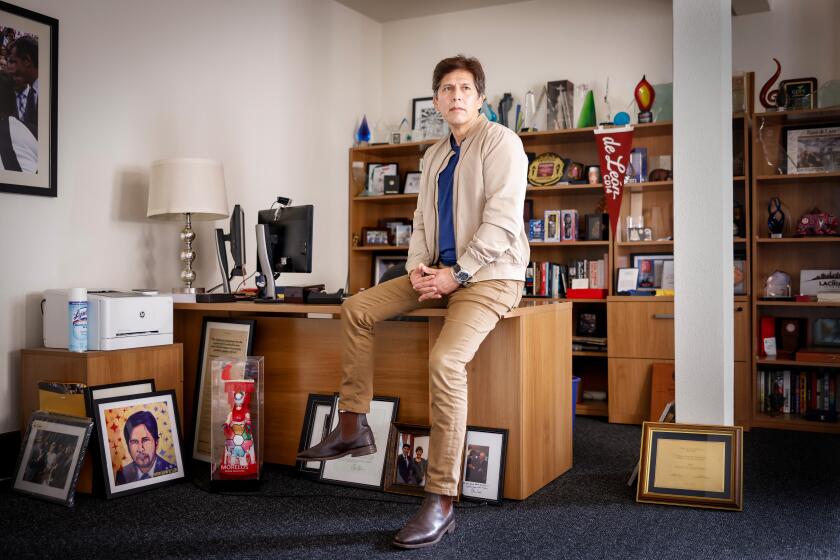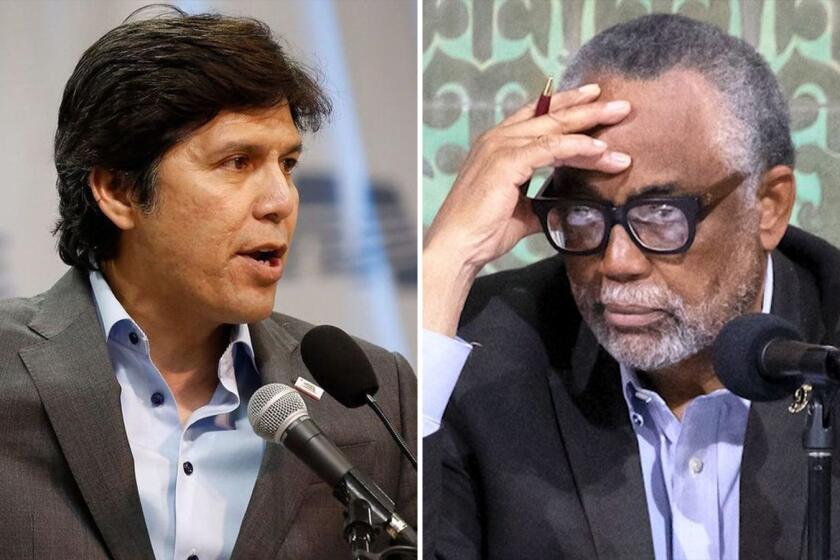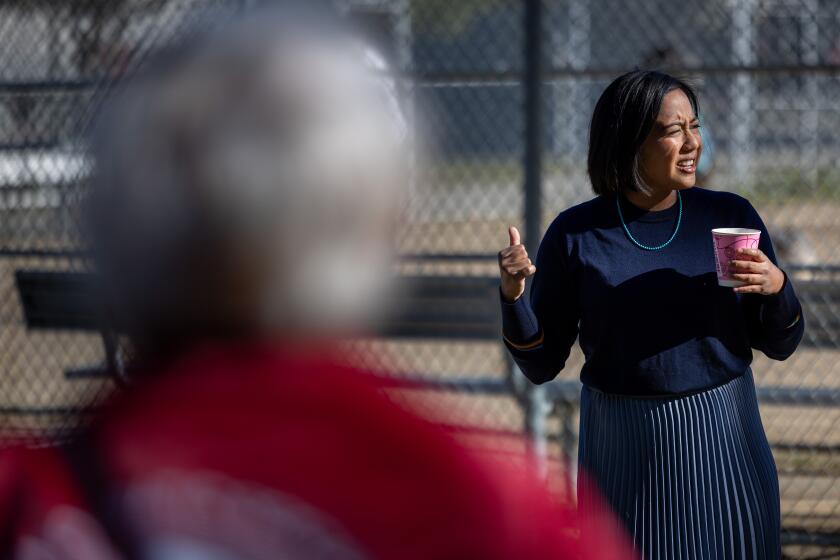David Zahniser covers Los Angeles City Hall for the Los Angeles Times.
- Share via
The politics of L.A.’s 14th City Council District have been anything but dull.
Over the past 40 years, the Eastside district has been the backdrop for corruption probes, sexual harassment allegations and bare-knuckle campaigning. It has been represented by savvy political players, including former Mayor Antonio Villaraigosa, and by Jose Huizar, who was sentenced to prison following his conviction in a sprawling bribery case.
The district’s lively political tradition continues this year, as City Councilmember Kevin de León — politically wounded by the 2022 audio leak scandal — faces a fierce challenge from tenant rights attorney Ysabel Jurado.
De León, a former state lawmaker, has been running as a champion of the district, someone with the skills and the work ethic to deliver on homelessness, housing, public safety and transportation.
Jurado, who came in first in the March 5 primary election, has portrayed De León as an ineffective, isolated figure. She says voters are eager to turn the page on the scandals that have buffeted the district for years.
If De León wins, it would be a remarkable comeback for a man who was shunned at City Hall just two years ago. If Jurado prevails, it would be yet another sign of the potent force of L.A.’s “super progressive” groups, who have ousted three incumbent council members in just four years — and are pushing hard for another victory.
Who are the candidates?
The son of a single mother with a third grade education, De León was elected to the state Assembly in 2006 to represent an L.A.-based district. Four years later, he won a seat in the state Senate, serving for a time as that chamber’s president pro tempore and eventually mounting an unsuccessful challenge to U.S. Sen. Dianne Feinstein.
De León, 57, who is of Mexican, Guatemalan and Chinese descent, has been a longtime ally of organized labor. Since taking office, he has fought for the construction of an array of facilities to serve his district’s homeless population, drawing recall threats from his critics. He also pushed for new measures to prevent the displacement of low-income families in his district.
A single mother who lives in Highland Park, Jurado got her start at City Hall as an administrative assistant and scheduler for Mayor Eric Garcetti. She earned her law degree from UCLA in 2019, then took a post with the nonprofit tenant rights group Bet Tzedek. After spending time in private practice, she’s running to push the council further left, by expanding the current three-member “super-progressive” voting bloc.
Jurado, 34, a first-time candidate, has worked closely with the L.A. chapter of Democratic Socialists of America, which has been door-knocking on her behalf. She has secured a range of endorsements from DSA-backed politicians, including Councilmembers Eunisses Hernandez, Hugo Soto-Martinez and Nithya Raman. If elected, she would blaze a new trail at City Hall, becoming the council’s first Filipino American member, according to city archivists.
Where is the district?
The 14th District takes in the vast majority of downtown, including Skid Row, Little Tokyo, the Arts District, the Historic Core and the Financial District. It includes all or part of Eagle Rock, Boyle Heights, El Sereno, Lincoln Heights, Highland Park and Hermon.
The back story
De León was enveloped in scandal in 2022, after he was heard participating in a secretly recorded conversation featuring racist and derogatory remarks and lengthy discussions about the city’s redistricting process. An array of political leaders, including President Biden, called for his resignation. Protesters shut down council meetings and demonstrated outside De León’s Eagle Rock home.
De León apologized and disappeared for two months, saying later that he did so because of threats to his safety. Once he returned, he slowly but methodically reentered civic life, working with those council members who had denounced him and eventually regaining his committee assignments.
Council President Marqueece Harris-Dawson, who took part in a 2022 protest outside De León’s home, said in a recent interview that the two have had a “heart-to-heart talk.”
“Kevin and I are at a place where we can work together on behalf of the people of the city,” he said in an interview.
A bombshell recording has thrown L.A. politics into chaos. What was really being discussed? L.A. Times reporters and columnists pick it apart, line by line.
Jurado, for her part, has sought to remind voters of the audio leak scandal, telling them De León should have stepped down immediately. She dinged him for missing hundreds of votes during his two-month absence. And she has lured away many of his onetime allies, including the Los Angeles County Federation of Labor — whose former leader was heard on the audio — and Service Employees International Union Local 721, which represents thousands of city workers.
De León, she said, has shown himself to be someone who doesn’t work well with others.
“You can’t govern in isolation,” she told a crowd in El Sereno.
De León has pushed back on that framing, saying he has been working with his counterparts at City Hall and in Sacramento to secure much-needed resources for downtown, El Sereno and other parts of his district. He also touted his own labor support, including endorsements from the city’s firefighters and several construction trade unions.
Public safety
De León has gone hard after Jurado on public safety by attempting to tie her to some of her most outspoken — and politically left — endorsers. He zeroed in on her relationship with Democratic Socialists of America, which has called in recent years for the defunding of the LAPD and the abolition of police overall.
Jurado, on her DSA candidate questionnaire, identified herself as an abolitionist — a supporter of eliminating police. Asked about abolition at a college meet-and-greet, she responded by saying: “What’s the rap verse? F— the police, that’s how I see ‘em.”
De León called on Jurado to apologize for her remark, which she has declined to do. He characterized her approach to public safety as “reckless,” saying the city needs more officers to combat crime.
Jurado has said that instead of more police, the city needs to invest more in youth programs, street lighting and sidewalk repairs. In a statement to The Times, Jurado said that the city’s approach to public safety “isn’t working.”
“Right now, the LAPD receives more than a quarter of our city’s budget, but we’re not seeing the results we need,” she said. “Los Angeles is facing a massive financial crisis, and we have to ask ourselves: Are we getting the best return on our investment?”
Jurado said she wants police to focus on violent crime, arguing that district residents “feel less safe than ever.” She has called for the LAPD to be “drastically re-imagined,” with money shifted out of the department and into other programs, such as affordable housing, mental health counseling and substance abuse treatment. She wants traffic enforcement duties to be taken away from police and turned over to unarmed city employees.
During the primary campaign, Jurado said she would have voted against Mayor Karen Bass’ first budget, which called for the hiring of 1,000 police officers. She opposed the package of pay raises that Bass negotiated with the city’s rank-and-file officers, calling the deal — which will add $1 billion in additional costs over four years — financially irresponsible.
The mayor’s spending plan for the coming year includes a key strategy for rebuilding the LAPD: persuading 200 recently retired officers to come back.
De León supports the mayor’s goal of restoring the LAPD to 9,500 officers, saying more officers are needed to address crime. He also voted for the package of police raises, saying those increases are needed to keep officers from taking jobs at other law enforcement agencies.
The department currently has fewer than 8,800 officers, down from about 10,000 five years ago.
“The number of LAPD officers is already dangerously low,” he said in an interview. “It’s a threat to our collective public safety, and we need a path forward to boost our numbers.”
Homelessness
Both De León and Jurado support Bass’ Inside Safe initiative, which has moved nearly 3,100 unhoused residents out of encampments and into motels, hotels or other types of housing. (Of that total, 868 have returned to the streets.) Both candidates want to build more interim housing for the district’s homeless population.
From there, however, the two start to diverge.
De León is an outspoken backer of Los Angeles Municipal Code 41.18, which prohibits homeless encampments next to schools, daycare centers and key locations selected by the council, such as freeway underpasses or senior centers. He said the law will help ensure that Angelenos — particularly students or those who use wheelchairs — don’t have to travel in busy traffic lanes to get around sidewalk encampments.
Jurado opposes the ordinance, arguing that it criminalizes poverty. She called the law expensive and ineffective, saying it leads to “sweeps” that push unhoused residents a few blocks away.
A leak purportedly exposed systemic failures of Los Angeles’ anti-camping law, reigniting a debate on the City Council. The reality on the streets is more complex.
The two candidates also have disagreed on De León’s interim housing strategy. During his tenure, the city acquired two motels on Huntington Drive, both of which were converted into interim homeless housing. De León has also opened three “tiny home” villages since taking office, using them to get people off the streets in Highland Park, El Sereno and Eagle Rock.
Jurado has spoken derisively about the tiny homes, referring to them as sheds. She said she wants facilities that are more “humane,” pointing to the Hilda L. Solis First Care Village, which is made up of shipping containers that offer much larger living quarters.
De León also praised the Solis facility, saying the city has provided funds for its social programs. The 232-bed facility is slated to receive $5.1 million in this year’s city budget.
Housing
De León and Jurado have portrayed themselves as fierce opponents of gentrification. Both have touted their work in fighting displacement, and their strategies for addressing housing affordability.
De León pointed to his work on DTLA 2040, a sweeping plan that requires that downtown developers devote a percentage of their apartment projects for affordable housing — a concept known as “inclusionary zoning.” In Boyle Heights, he secured the approval of a temporary ban on the demolition of rent-stabilized apartments, where rent increases were capped by the city at 6% this year.
The two plans were designed to spur the construction of affordable housing, while establishing new safeguards to prevent displacement of low-income families.
Jurado, for her part, said she would push for the development of more “social housing” — publicly-owned housing projects that are at least partly managed by tenants. She called for the city to explore the use of eminent domain: having government acquire land or buildings, even if the property owner doesn’t want to sell.
“Ysabel has always believed we should be using every tool at our disposal to prioritize the working class over wealthy developers,” said Naomi Villagomez Roochnik, a campaign spokesperson.
Jurado has criticized De León for voting last year to allow rent hikes of 4% in the city’s rent-stabilized apartments, which largely were built before October 1978 — or up to 6% if a landlord pays for gas and electricity. She said she would seek new limits on rent hikes in such buildings.
De León defended his vote, saying that owners of L.A.’s rent-stabilized buildings had gone nearly four years without permission from the city to increase their rents. He also noted that the council reduced the size of the original proposal, which called for increases of up to 7%, or 9% if the landlords pay for utilities.
Los Angeles landlords who pay tenants’ utilities will be able to raise rents slightly more, by up to 6%.
The two candidates also disagree on city planning issues. Jurado said the city should allow apartment buildings to be constructed in neighborhoods zoned for single-family homes. The Department of City Planning recently recommended that apartments remain off-limits in such areas, a move denounced by Jurado.
“This decision is essentially a continuation of shameful racist and classist zoning policies which implemented segregation through housing laws,” Jurado said on X, the social media platform.
De León said he supports the preservation of single-family zoning in such neighborhoods, including Eagle Rock, Highland Park and El Sereno, saying the district can meet its housing needs by focusing growth in downtown Los Angeles.
“With our DTLA 2040 community plan, downtown Los Angeles will continue to lead the way for production of more housing units while stopping the gentrification of neighborhoods,” said De León campaign spokesman David Meraz.
Police abolition — and law enforcement spending overall — has emerged as a political fault line in two L.A. city council races, particularly for voters worried about crime and disorder.
Kevin de León is the last one standing after an audio leak caught him in a conversation that featured racist and derogatory remarks. Now he’s running for reelection.
Asked a question about spending at the LAPD, attorney Ysabel Jurado responded: ‘What’s the rap verse? F— the police, that’s how I see ‘em.’
Candidates on the left made crucial advances in the March 5 primary election for City Council, setting the stage for some hard-fought runoff campaigns.
The attacks come days before the Nov. 5 election
Ysabel Jurado has declined to apologize for saying “f— the police,” in a contest where the issue of when and how to apologize has been a dominant theme.
In a letter sent to his colleagues, Council President Paul Krekorian said Price and De León would each be added to four committees. He gave no explanation for his action.
First-time candidate Ysabel Jurado led the field of eight candidates, ahead of Councilmember Kevin de León, in the race to represent an Eastside district.
Jurado said De León failed to effectively represent the district. De León said Jurado is extreme, aligning herself with activists who want to defund the LAPD.
L.A. Times Editorial Board Endorsements
The Times’ editorial board operates independently of the newsroom — reporters covering these races have no say in the endorsements.
How to vote


